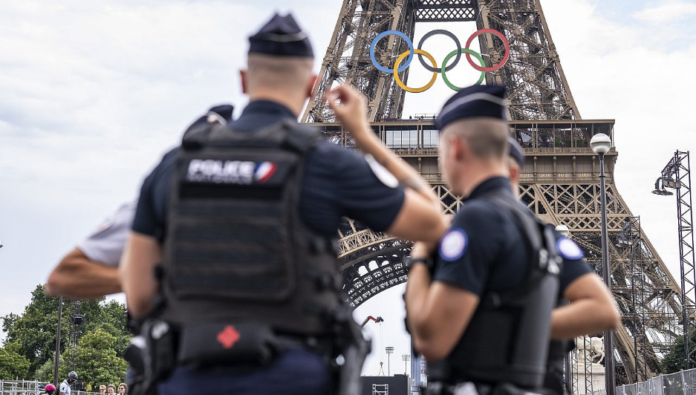Paris: France is transforming its capital into an unprecedented open-air fortress as it embarks on the largest peacetime security operation in the nation’s history to safeguard the upcoming Paris Olympic Games. With the Games set to begin Wednesday, the city is bracing for an extensive security presence to protect athletes, residents, and over 10 million visitors.
A staggering 45,000 police officers, 10,000 soldiers, and 22,000 private security guards will be deployed across Paris. Security personnel will be stationed throughout the city, including on streets, at landmarks, and along the Seine River, where various events will take place.
Also Read: Snoop Dogg to Carry Olympic Flame in Paris Ahead of Opening Ceremony
Key locations across Paris are being transformed for the Games. Place de la Concorde, the city’s largest public square, will host BMX bike races, skateboarding, and breakdancing—a new addition to the Olympic lineup. The Eiffel Tower will feature sand-covered beach volleyball courts, while archery events are set to occur on the esplanade by the Invalides, a historic military complex.
The strategic distribution of events throughout the city aims to showcase Western democracies’ ability to host major international events that are accessible to the public. However, the expansive nature of the Games presents significant security challenges, with around 10,500 athletes from over 190 nations and numerous world leaders expected to attend.
French officials are particularly vigilant against potential threats from Islamist militants and state-sponsored sabotage, particularly from Russia and Iran, heightened by ongoing conflicts in Ukraine and Gaza.
“The idea is to bring events into the heart of the city, maximizing public access,” said Nicolas Nordman, security adviser to the Paris mayor. “This approach significantly elevates the security challenges compared to a stadium setting.”
France’s security mobilization exceeds that of the London Olympics by nearly threefold. In a historic first, U.S. police departments from New York, Los Angeles, and Fairfax County are assisting with the security efforts, including the deployment of bomb-sniffing dogs.
The opening ceremony on Friday poses the greatest security challenge. Expected to be the most-attended Olympic opening in history, it will feature a 4-mile parade of boats along the Seine, with authorities estimating up to 300,000 spectators. The French military will secure the surrounding airspace, and antidrone squads will be active throughout the Games.
Authorities have sealed off the Seine banks a week prior to the event and are relocating homeless individuals to temporary housing. Security measures include stringent background checks, with over one million conducted around restricted areas.
The Paris Games coincide with a major political crisis in France, as snap elections have resulted in a fractured parliament and a caretaker government. The potential for protests over the political situation adds additional pressure on the security forces tasked with ensuring a safe Games.
In a recent high-profile incident, French police conducted a preemptive search of a former convict’s home, investigating potential threats to the Games. The individual, previously convicted of spreading Islamic State propaganda, faced temporary restrictions as a precaution.
The French government is also testing new security technologies, including advanced video surveillance systems that monitor live feeds for potential threats. Cybersecurity is a major focus, with concerns about potential attacks similar to those on the 2018 Winter Olympics in South Korea.
With tensions high, especially regarding Russia’s possible interference, French authorities have made several arrests related to security threats. The Paris Games are seen as a pivotal moment for France, demonstrating resilience and a commitment to overcoming challenges.
Hosting the Olympics is part of a broader strategy to revitalize blighted areas, such as the Seine-Saint-Denis district, where the Olympic Village and media center are located. These developments are intended to leave a lasting positive impact on local communities.



